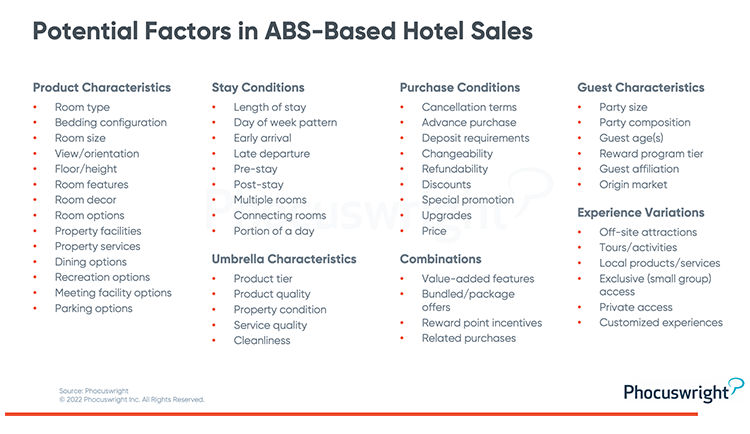Hotels: on the path to attribute-based prosperity or calamity?
- Published:
- May 2022
- Analyst:
- Phocuswright Research
The dream of every modern lodging executive is to sell an experience that goes beyond a simple overnight stay in a room. Their objective is to make the hotel the foundational component to any trip - serving as a home base that empowers the guest to have successful trips and create indelible memories. The goal is inspiring loyal guests that spend more, return more often and become advocates that promote the brand to their families, friends and social circles.
That dream is manifesting itself under the umbrella of "Attribute-based Selling" (ABS). At its core, ABS is a combination of merchandising methods and revenue management practices that unbundles the hotel product. According to Phocuswright’s latest travel research analysis Hotels: On the Path to Attribute-based Prosperity or Calamity?, distinct attribute combinations that may be of interest to an individual are identified for each traveler. Ideally, ABS not only helps better match an offer to a traveler's specific needs, but also allows hoteliers to assess a premium for the attributes that create the greatest consumer value.
Since the emergence of the ABS concept, large technology providers like Amadeus, IDeaS and Shiji have introduced some ABS-ready features into their products. Widespread industry adoption, however, will require broader hospitality cross-tech stack integration, extending to intermediary distribution channels:
- The first step will be to establish standards to help simplify the system interoperability needed to facilitate tech stack upgrades. A strong technical integration framework is essential to organize and manage all customized product variations and combinations and to ensure that what is sold is delivered accurately.
- How inventory is controlled and priced may represent the greatest ABS-related challenge for hoteliers. The products and methods will be new, and there will be a learning curve before sufficient sales performance and guest satisfaction data are available to understand the revenue management processes.
- Perhaps most important will be the strategies employed to maximize sales, margins and to limit inefficiencies related to aligning inventory access with changing demand patterns.
- Finally, simplifying the merchandising of ABS-based product offerings must be designed from a guest-centric perspective to clearly present appropriate recommendations and logically communicate the value proposition offered by various product combinations.

(Click image to view a larger version.)
The successful deployment of hotel industry ABS initiatives may face considerable challenges. Nevertheless, it offers a dramatic opportunity to redefine hospitality and travel value paradigms, while spurring innovation in how new benefits are presented to and leveraged by guests. If properly executed, hoteliers will be able to create value by tailoring relevant combinations of room, dining, services, facilities, and destination activities into an enriching, truly personalized guest experience. This value can translate into the sorts of experiences that create indelible memories, enhance customer lifetime value and develop a loyal following of brand evangelists.
Not without its challenges, ABS adoption carries some initial startup costs and requires significant modifications to long-held legacy processes. This analysis highlights some of the key benefits and pitfalls associated with attribute-based selling.
This article is part of a content series that explores some of the most significant technology-driven trends that will influence travel distribution in 2022 and beyond. It’s free for Phocuswright Open Access subscribers. Not a subscriber? Discover how you and your entire company can access the entire Phocuswright research library and data visualization tools here.







.png)

.jpg)

